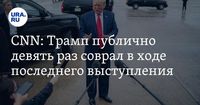Senator Lisa Murkowski has publicly criticized President Donald Trump for what she views as a drastic shift in U.S. foreign policy, particularly regarding Ukraine and NATO. Expressing her disbelief at the administration's recent actions, she stated, "I am stunned that we may leave Ukraine and destroy long-standing alliances—from NATO to NORAD. How did we get to a place where we're fighting Canada and making nice with Russia?! This is beyond my comprehension."
Murkowski's comments come at a time when many of her Senate colleagues remain silent on the issue, fearing, as she explains, "they will be destroyed, that they will be wiped out, that their names will come up in the media." This climate of fear, she asserts, has silenced many who might otherwise speak out against Trump and his key advisor, Elon Musk.
The senator emphasized that Russia continues to pose a significant threat to the United States, making a case against trusting Vladimir Putin. "Until we have to scramble fighters to drive off Russian bombers, I am not going to trust Putin and I am not going to be silent about it. I will stand my ground and speak out about it," Murkowski said, underscoring her commitment to addressing these geopolitical challenges openly.
Adding to her concerns, earlier reports from the Financial Times revealed that Trump aimed to renegotiate U.S. aid agreements, expanding economic demands on Ukraine in a potential shake-up of existing agreements. This has fueled further apprehension among U.S. lawmakers regarding the administration's trajectory.
As she addressed her fellow senators, Murkowski positioned herself as a voice of dissent among the backdrop of fear that currently envelops many Democrats and even some Republican senators, who grapple with the ramifications of speaking out against their party's leader. "You made everyone silent. But we cannot be made to be silent," she implored.
The dynamics of U.S. foreign policy have grown increasingly complex under the Trump administration, with many questioning the administration’s motives and strategies. Murkowski's critical remarks reflect a broader anxiety within and outside Congress regarding America's direction on the world stage—particularly with its longstanding alliances, which may shift as the Trump administration recalibrates its diplomatic relationships.
In conclusion, Murkowski's outspoken nature challenges her peers to reconsider their positions and act in the best interest of U.S. security and global alliances. As the geopolitical landscape evolves, her calls for transparency and accountability resonate with a significant portion of the electorate concerned with national security in a changing world.





